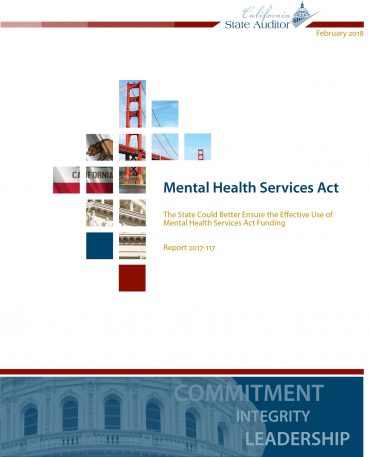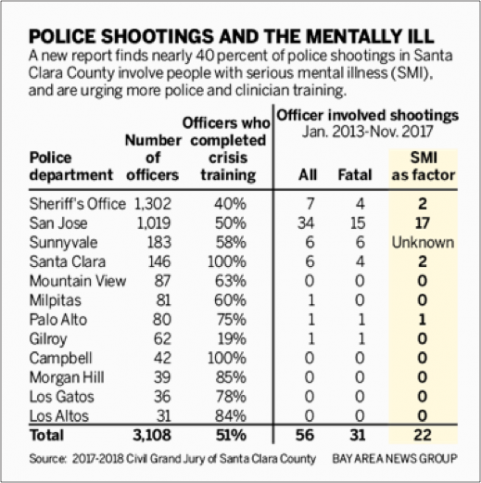Many tragic incidents involving public safety officers and individuals with mental illness could be more safely managed if state and local governments focused funding on proven public safety and community based mental health programs and strategies.
The negative consequences of not adequately treating individuals with mental illness reverberate throughout our society.
Those consequences are only exacerbated when public safety officers are called to manage a mental health crisis situation without being provided the necessary training and support to safely manage those situations.
In February of 2018 California’s State Auditor, Elaine M. Howle, released an audit of the Mental Health Services Act (MHSA) titled “The State Could Better Ensure the Effective Use of Mental Health Services Act Funding“. Voters passed Proposition 63 in 2004 to fund the Mental Health Services Act by imposing a 1 percent income tax on those earning in excess of $1 million a year.
The audit identified two billion in unspent dollars that could be allocated to address California’s mental health crisis and make our state safer for all residents. Providing additional mental health and substance abuse treatment, ensuring inmates in state prisons are provided mental health services prior to release, and deploying trained teams of public safety officers and mental health clinicians to respond to calls involving those with a mental illness are all worthy of funding.
Most incarcerated individuals will be released. Of the inmates released from California prisons, nearly half will be re-arrested within a 3-year period. Los Angeles County houses 18,000 inmates with approximately 30% having been diagnosed with mental illness, in Santa Clara County almost half of the approximately 3,000 inmates have mental health or behavioral issues. According to research from California Health Policy Strategies, 20% of inmates in the 46 California counties surveyed are prescribed psychotropic medication.
Utilizing unspent resources to provide proper and timely mental health care for inmates, especially those within 2 years of release will create a safer California. This approach is more cost effective than releasing individuals who have not benefited from a comprehensive treatment plan while in custody and face limited mental health services while out of custody.
Targeting resources to provide mental health treatment and programs to as many individuals that need it will make California safer. Providing these resources will reduce the number of times 9-1-1 is called for public safety officers to resolve a mental health crisis.
Yet, no matter how comprehensive and efficient the delivery of mental health and substance abuse programs become, there will be thousands of incidents across California where public safety officers will encounter individuals experiencing a mental health crisis. As such, providing funding to expand public safety programs that improve outcomes when those in crisis interact with public safety officers is a smart investment.
The LAPD deploys System-wide Mental Assessment Response Teams (SMART) to respond to incidents where a mental health crisis is occurring. Police officers are teamed up with trained mental health clinicians to navigate through a mental health crisis situation. Unfortunately, there are only 17 of these teams deployed at any one time.
The LAPD delivers police services over a geographical area that encompasses 468.7 miles with a population of just over 4 million. In 2018, the department received 20,390 verified mental health crisis calls, this doesn’t include the thousands of officer initiated interactions with those experiencing a mental health crisis. SMART units responded to 8,338 of these calls. There is a clear need for additional resources to expand this effective program.

Other jurisdictions have similar programs to respond to mental health crisis situations. But many do not. A lack of resources to train and deploy these specialized teams prohibits most jurisdictions from moving in this direction. Although there is technical support provided to public safety agencies grappling with the increase in their respective mental health call load, the lack of funding is a barrier to entry for most.
Protect California will be advocating for additional mental health treatment and programs to prevent crisis situations and for additional training for public safety officers to respond to these crisis situations with the necessary tools for improved outcomes. California’s safety will improve if we are successful.


